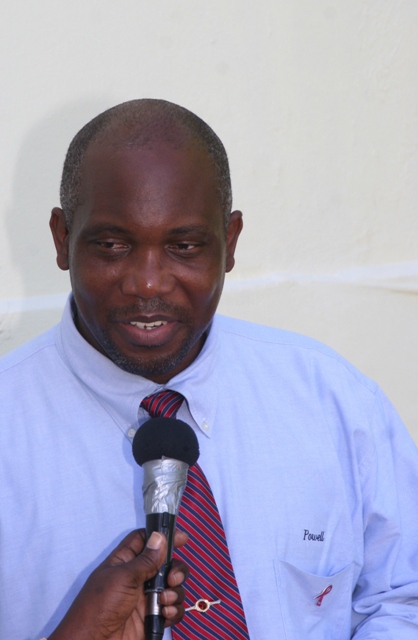Communications Minister Highlights Importance of Millennium Development Goals

CHARLESTOWN NEVIS (November 3, 2010) — “Unfortunately in the small island developing states, we seem not to pay too much attention to the Millennium Development Goals [MDGs],” said Junior Minister in the Nevis Island Administration [NIA], the Honourable Carlisle Powell. This came at the Lyn Jeffers School’s fourth annual commemoration of United Nations [UN] Day held late last month.
In his address to mark the day’s observance, the Communications minister saw the need to educate the students, their parents and the members of staff on the MDGs identified by the UN and their specific importance to persons residing on Nevis.
While developmental goals one and two aim at ending hunger and poverty and achieving universal primary education respectively, Minister Powell said that Nevisians may not immediately appreciate the importance of them [the goals] because the prevalence of poverty and the notion of not receiving universal primary education were foreign to persons residing on Nevis.
“In Nevis where every child goes to school, we cannot imagine that in Sub-Saharan, Africa and Southern Asia, the vast majority of children in those areas in the world are out of school,” he explained, adding that “there are about 69 million children of school age who do not go to any form of school.”
The underlying vision of developmental goal number one, according to Minister Powell, is to “half the proportion of people whose income is less than $US1 per day” while including “full and productive employment and decent work for all; including women and children.”
“Girls in many regions of the world get no access to education. Having received no education, they are paid less. They also get lower quality jobs and as a result, men outnumber women in the workforce easily,” said Minister Powell as he elaborated on the importance of developmental goal number three which aims at promoting gender equality and empowering women.
While addressing developmental goals numbers four and five which are to reduce child mortality, specifically that of children under the age of five, and to reduce by 75 percent the maternity mortality rate thereby improving maternal health, the Communications minister said it was reported that “there are approximately 9 million children who die before reaching the age of five” and that “every year, more than 350,000 women die during pregnancy or child birth.”
Combating HIV/AIDS, Malaria and other diseases was the sixth MDG discussed by Minister Powell who explained that the “ambitious goal” seeks to “halt the spread of AIDS by 2015 and to begin to reverse the trend.”
Although Minister Powell was pleased that HIV/AIDS education had increased significantly, leading to “greater protection being used,” he frowned on the thought of “Malaria killing one child every 45 seconds” and that “approximately 18 million people died from Tuberculosis in 2008.”
As Minister Powell explained the possible harm if countries do not ensure that MDG number seven; environmental sustainability, is carried out, he encouraged the gathering to protect the environment.
“We also have a role to play to slow global warming,” he exclaimed. “It has been projected that a two degree rise in temperature may result in sea level rise of between three to five feet. This would mean that some of the islands in the world would completely disappear. Certainly, some of our coastlines would be under water,” he summarized.
“The United Nations insist that the countries of the world should look at the special needs of developing islands like St. Kitts and Nevis,” Minister Powell said as he explained the final MDG; to develop a global partnership for development.
Following the UN’s identification of the MDGs in 1990, countries pledged to work towards achieving the goals by 2015. The “ambitious 25 year plan” as Minister Powell describes it, is backed by the slogan “We can end poverty by 2015.”
